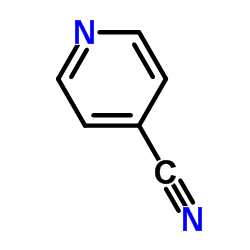14389-12-9
| Name | 4-(2H-tetrazol-5-yl)pyridine |
|---|---|
| Synonyms |
5-(4-Pyridyl)-1H-Tetrazole
MFCD00068115 5-(4-pyridyl)-2H-1,2,3,4-tetraazole 2-(1H-Tetrazol-5-yl)pyridine 2-(2H-tetraazol-5-yl)pyridine Pyridine,4-(2H-tetrazol-5-yl) 2-(1H-tetrazol-5'-yl) pyridine 5-(4'-pyridyl)tetrazole 4-(2H-TETRAZOL-5-YL)-PYRIDINE Pyridine, 2-(1H-tetrazol-5-yl)- 4-(1H-tetrazol-5-yl)-pyridine 4-(1-H-tetrazole-5-yl)pyridine |
| Density | 1.4±0.1 g/cm3 |
|---|---|
| Boiling Point | 377.1±34.0 °C at 760 mmHg |
| Melting Point | 265 °C |
| Molecular Formula | C6H5N5 |
| Molecular Weight | 147.137 |
| Flash Point | 190.9±18.6 °C |
| Exact Mass | 147.054489 |
| PSA | 67.35000 |
| LogP | 0.56 |
| Vapour Pressure | 0.0±0.9 mmHg at 25°C |
| Index of Refraction | 1.629 |
Synonym:5-(Pyrid-4-yl)-1H-tetrazol Section 2 - COMPOSITION, INFORMATION ON INGREDIENTS
Risk Phrases: 11 Section 3 - HAZARDS IDENTIFICATION EMERGENCY OVERVIEW
Highly flammable. Potential Health Effects Eye: May cause eye irritation. Skin: May cause skin irritation. May be harmful if absorbed through the skin. Ingestion: May cause irritation of the digestive tract. May be harmful if swallowed. Inhalation: May cause respiratory tract irritation. May be harmful if inhaled. Chronic: Not available. Section 4 - FIRST AID MEASURES Eyes: Flush eyes with plenty of water for at least 15 minutes, occasionally lifting the upper and lower eyelids. Get medical aid. Skin: Get medical aid. Flush skin with plenty of water for at least 15 minutes while removing contaminated clothing and shoes. Ingestion: Get medical aid. Wash mouth out with water. Inhalation: Remove from exposure and move to fresh air immediately. Notes to Physician: Treat symptomatically and supportively. Section 5 - FIRE FIGHTING MEASURES General Information: As in any fire, wear a self-contained breathing apparatus in pressure-demand, MSHA/NIOSH (approved or equivalent), and full protective gear. Flammable solid. Extinguishing Media: Use water spray, dry chemical, carbon dioxide, or chemical foam. Section 6 - ACCIDENTAL RELEASE MEASURES General Information: Use proper personal protective equipment as indicated in Section 8. Spills/Leaks: Vacuum or sweep up material and place into a suitable disposal container. Remove all sources of ignition. Use a spark-proof tool. Section 7 - HANDLING and STORAGE Handling: Use spark-proof tools and explosion proof equipment. Avoid breathing dust, vapor, mist, or gas. Avoid contact with skin and eyes. Storage: Keep away from sources of ignition. Store in a cool, dry place. Store in a tightly closed container. Flammables-area. Section 8 - EXPOSURE CONTROLS, PERSONAL PROTECTION Engineering Controls: Use adequate general or local explosion-proof ventilation to keep airborne levels to acceptable levels. Exposure Limits CAS# 14389-12-9: Personal Protective Equipment Eyes: Not available. Skin: Wear appropriate protective gloves to prevent skin exposure. Clothing: Wear appropriate protective clothing to prevent skin exposure. Respirators: Follow the OSHA respirator regulations found in 29 CFR 1910.134 or European Standard EN 149. Use a NIOSH/MSHA or European Standard EN 149 approved respirator if exposure limits are exceeded or if irritation or other symptoms are experienced. Section 9 - PHYSICAL AND CHEMICAL PROPERTIES Physical State: Solid Color: off-white Odor: Not available. pH: Not available. Vapor Pressure: Not available. Viscosity: Not available. Boiling Point: Not available. Freezing/Melting Point: 265 - 267 deg C Autoignition Temperature: Not available. Flash Point: Not available. Explosion Limits, lower: Not available. Explosion Limits, upper: Not available. Decomposition Temperature: Solubility in water: Specific Gravity/Density: Molecular Formula: C6H5N5 Molecular Weight: 147 Section 10 - STABILITY AND REACTIVITY Chemical Stability: Not available. Conditions to Avoid: Incompatible materials, ignition sources. Incompatibilities with Other Materials: Oxidizing agents, bases, acid chlorides. Hazardous Decomposition Products: Hydrogen cyanide, nitrogen oxides, carbon monoxide, carbon dioxide. Hazardous Polymerization: Has not been reported Section 11 - TOXICOLOGICAL INFORMATION RTECS#: CAS# 14389-12-9 unlisted. LD50/LC50: Not available. Carcinogenicity: 4-(1H-1,2,3,4-Tetraazol-5-yl)pyridine - Not listed by ACGIH, IARC, or NTP. Section 12 - ECOLOGICAL INFORMATION Section 13 - DISPOSAL CONSIDERATIONS Dispose of in a manner consistent with federal, state, and local regulations. Section 14 - TRANSPORT INFORMATION IATA Shipping Name: FLAMMABLE SOLID, ORGANIC, N.O.S.* Hazard Class: 4.1 UN Number: 1325 Packing Group: III IMO Shipping Name: FLAMMABLE SOLID, ORGANIC, N.O.S. Hazard Class: 4.1 UN Number: 1325 Packing Group: III RID/ADR Shipping Name: FLAMMABLE SOLID, ORGANIC, N.O.S. Hazard Class: 4.1 UN Number: 1325 Packing group: III Section 15 - REGULATORY INFORMATION European/International Regulations European Labeling in Accordance with EC Directives Hazard Symbols: F Risk Phrases: R 11 Highly flammable. Safety Phrases: S 16 Keep away from sources of ignition - No smoking. WGK (Water Danger/Protection) CAS# 14389-12-9: No information available. Canada None of the chemicals in this product are listed on the DSL/NDSL list. CAS# 14389-12-9 is not listed on Canada's Ingredient Disclosure List. US FEDERAL TSCA CAS# 14389-12-9 is not listed on the TSCA inventory. It is for research and development use only. SECTION 16 - ADDITIONAL INFORMATION N/A |
| Hazard Codes | F:Highlyflammable; |
|---|---|
| Risk Phrases | R11 |
| Safety Phrases | S22-S36/37/39 |
| HS Code | 2933990090 |
|
~99% 
14389-12-9 |
| Literature: Journal of the Brazilian Chemical Society, , vol. 23, # 12 p. 2197 - 2203 |
| HS Code | 2933990090 |
|---|---|
| Summary | 2933990090. heterocyclic compounds with nitrogen hetero-atom(s) only. VAT:17.0%. Tax rebate rate:13.0%. . MFN tariff:6.5%. General tariff:20.0% |
